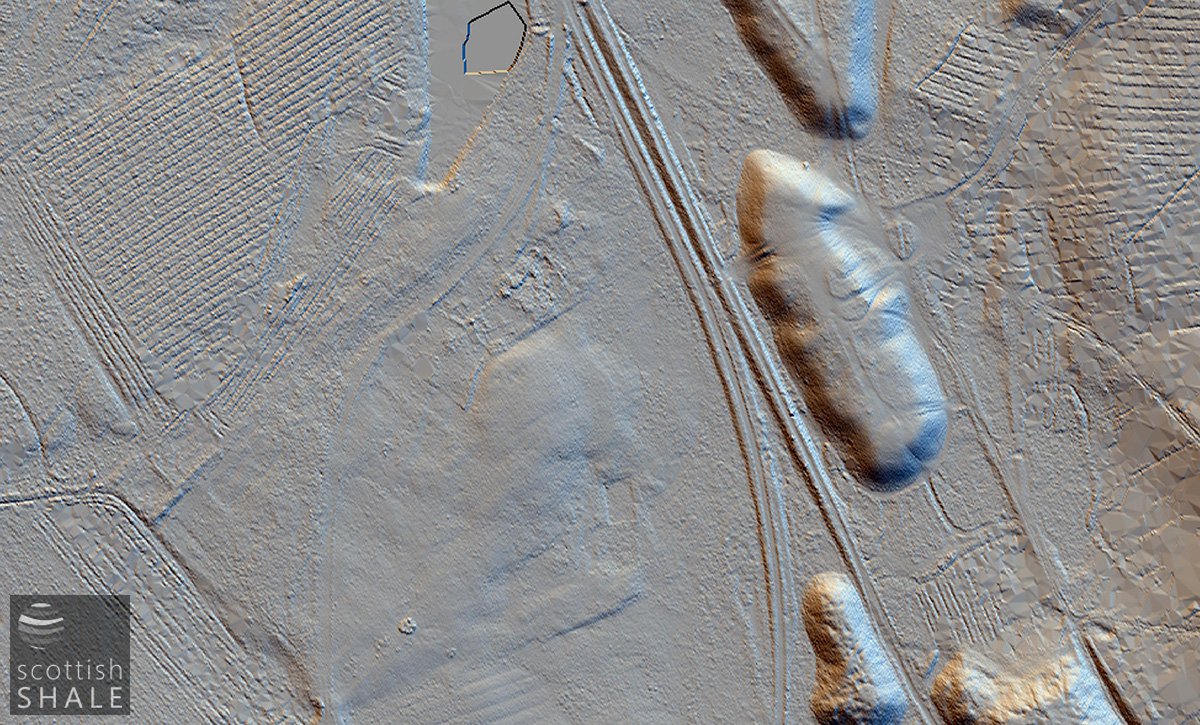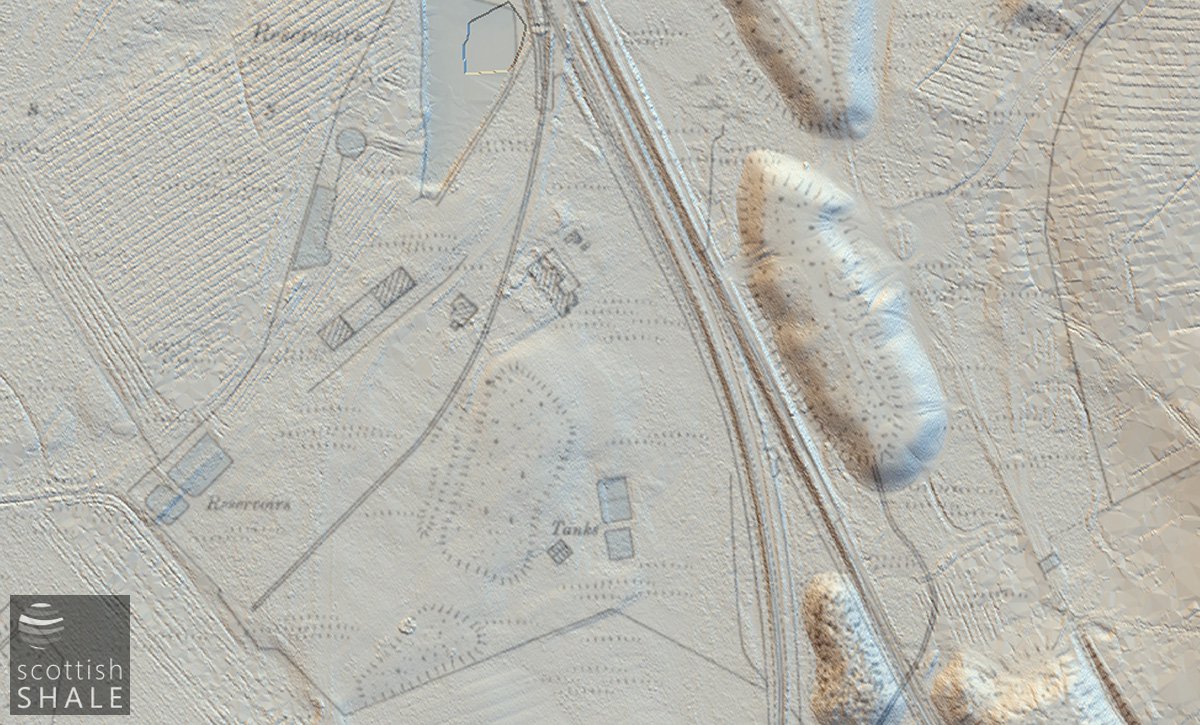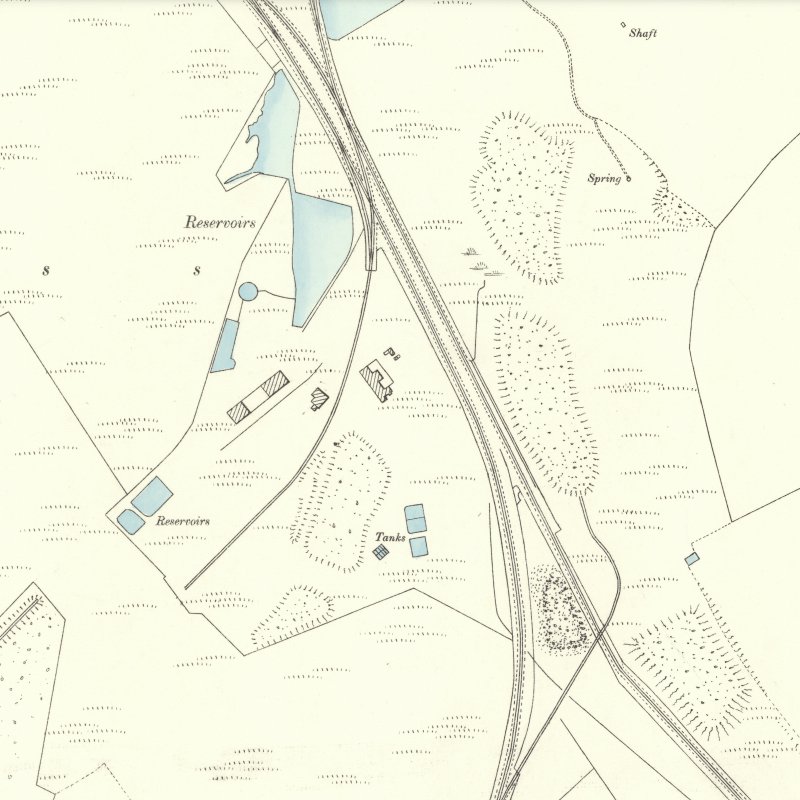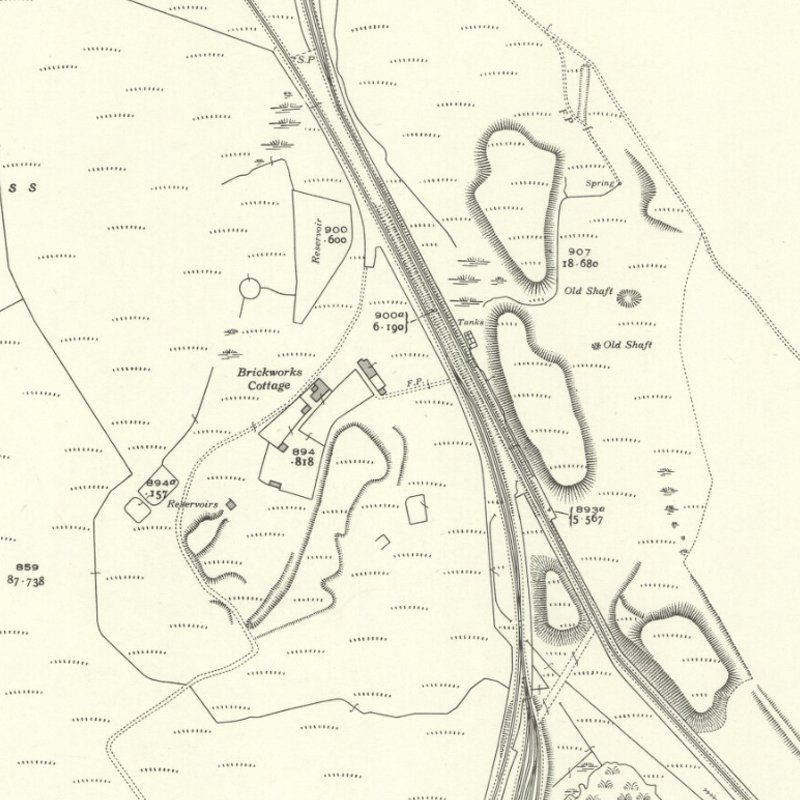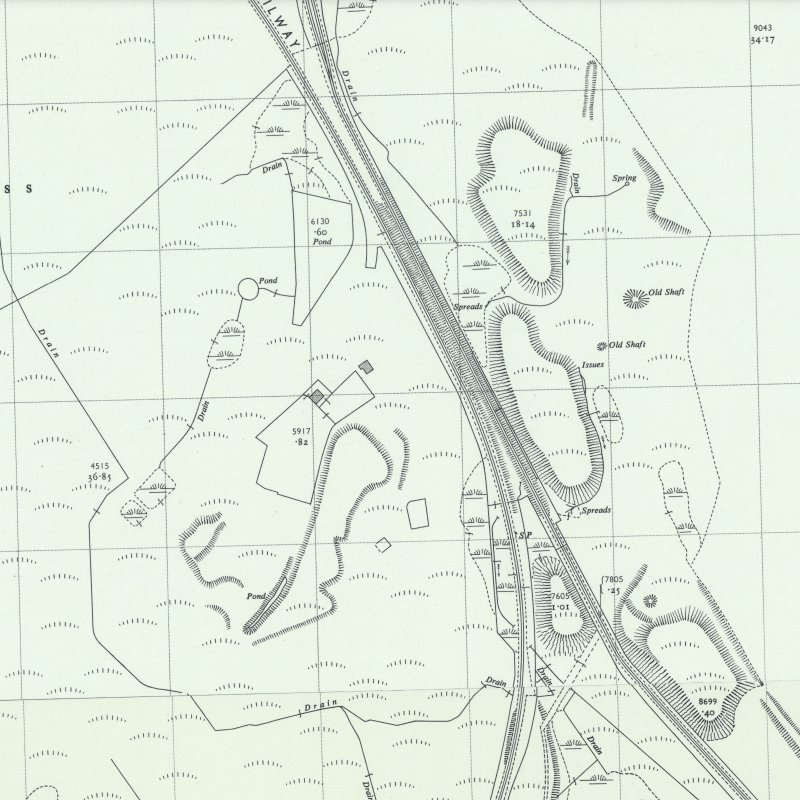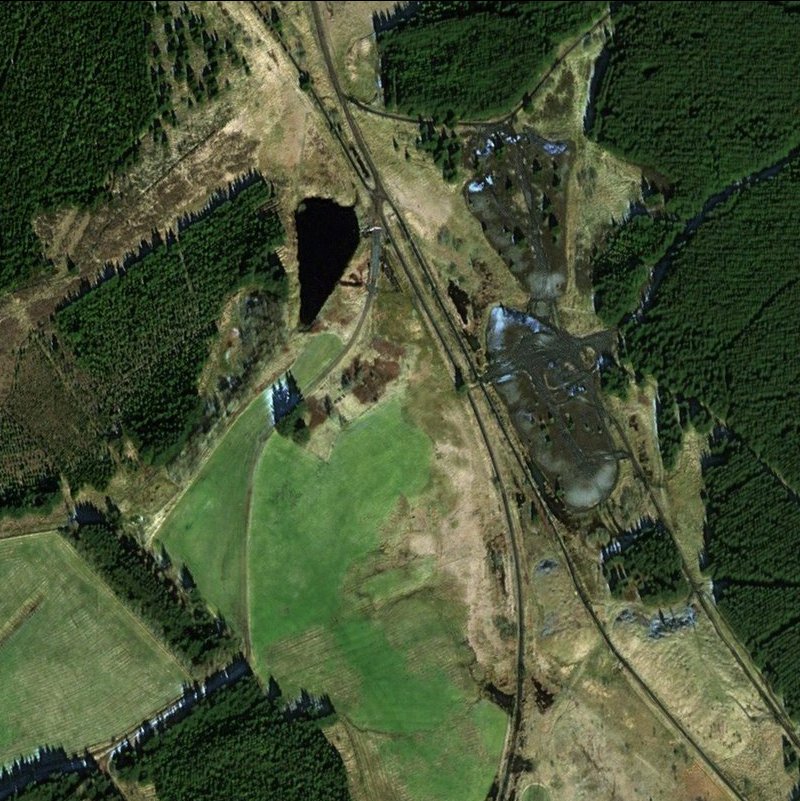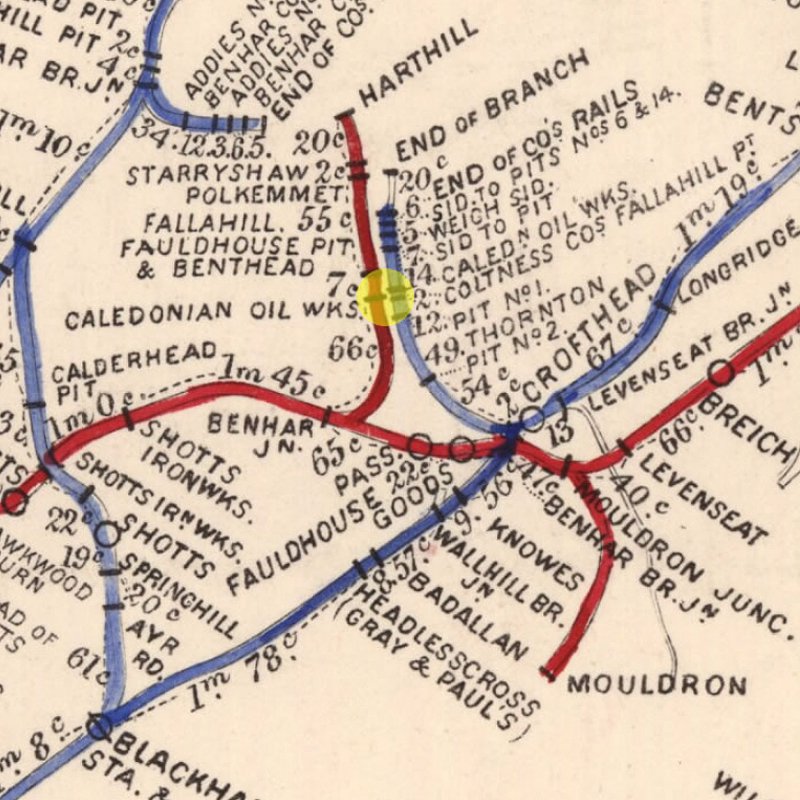- Aberdeen Oil Works
- Addiewell Oil Works
- Almondhill Oil Works
- Annick Lodge Oil Works
- Arden Oil Works
- Armadale Oil Works
- Auchenheath Oil Works
- Avonhead Oil Works
- Balgray Oil Works
- Ballat Oil Works
- Bathgate Oil Works
- Bathville Oil Works
- Bellsdyke Oil Works
- Bellsquarry Oil Works
- Benhar Oil Works
- Binnend Oil Works
- Birkenshaw Oil Works
- Bishop Street Oil Works
- Blackburn Oil Works
- Blackstone Oil Works
- Blackstoun Oil Works
- Blochairn Oil Works
- Boghall Oil Works
- Bredisholm Oil Works
- Breich Oil Works
- British Asphalte Oil Works
- Broxburn Oil Works
- Broxburn - Bell's Stewartfield Oil Works
- Broxburn - Albyn Oil Works
- Broxburn - East Mains Oil Works
- Broxburn - Greendykes Oil Works
- Broxburn - Hallfarm Oil Works
- Broxburn - Hutchinson's Oil Works
- Broxburn - Poynter's Oil Works
- Broxburn - Steele's Oil Works
- Broxburn - Steele's Stewartfield Oil Works
- Buckside Oil Works
- Burngrange Oil Works
- Calderbank Oil Works
- Canalbank Oil Works
- Champfleurie Oil Works
- Clippens Oil Works
- Cobbinshaw North Oil Works
- Cobbinshaw South Oil Works
- Coneypark Oil Works
- Craigie Oil Works
- Crown Point Oil Works
- Dalmeny Oil Works
- Deans Oil Works
- Doura Oil Works
- Drumbow Oil Works
- Drumcross Oil Works
- Drumgray Oil Works
- Dryflat Oil Works
- East Fulton Oil Works
- East Hermand Oil Works
- Eldin Oil Works
- Falkirk Oil Works
- Fergushill Oil Works
- Forthbank Oil Works
- Forth & Clyde Oil Works
- Gavieside Oil Works
- Grange Oil Works
- Grangepans Oil Works
- Greengairs Oil Works
- Hareshaw Oil Works
- Hartwood Oil Works
- Hawick Oil Works
- Hermand Oil Works (1866)
- Hermand Oil Works (1883)
- Holmes Oil Works
- Hopetoun Oil Works
- Hurlford Oil Works
- Inkerman Oil Works
- Inverkeithing Oil Works
- Kilrenny Oil Works
- Kilwinning Oil Works
- Kirkmuirhill Oil Works
- Kirkwood Oil Works
- Lanark Oil Works
- Lanemark Oil Works
- Levenseat Oil Works
- Limerigg Oil Works
- Linwood Oil Works
- Loanhead Oil Works
- Lochburn Road Oil Works
- Lochgelly Oil Works
- Longrigg Oil Works
- Magdalene Oil Works
- Methil Oil Works
- Millburn Oil Works
- Nettlehole Oil Works
- Niddry Castle Oil Works
- Nitshill Oil Works
- Oakbank Oil Works
- Palacecraig Oil Works
- Pathhead Oil Works
- Patterton Oil Works
- Pentland Oil Works
- Philpstoun Oil Works
- Port Dundas Oil Works
- Possil Oil Works
- Pumpherston Oil Works
- Raebog Oil Works
- Riggend Oil Works
- Rochsoles Oil Works
- Rochsolloch Oil Works
- Roman Camp - Almondfield Oil Works
- Roman Camp - Cawburn Oil Works
- Roman Camp Oil Works (1892)
- Roman Camp - Shale Oil Works
- Rosebank Oil Works
- Roughcraig Oil Works
- Rumford Street Oil Works
- Seafield Oil Works
- Shawsburn Oil Works
- Sheepford Locks Oil Works
- Shettleston Oil Works
- Shotts Oil Works
- Stand Oil Works
- Stanrigg Oil Works
- Stonehouse Oil Works
- Straiton Oil Works
- St. Rollox Works
- Swinehill Oil Works
- Tarbrax Oil Works
- Uphall Oil Works
- Uphall - Railway Oil Works
- Uphall - Wyllie's Oil Works
- Vulcan Chemical Works
- Wardend Oil Works
- Wattston Oil Works
- Westfield & Capeldrae Oil Works
- Westwood Oil Works (1941)
- Westwood Oil Works (1866)
- Whitebog Oil Works
- Whitehill Oil Works (Lanarkshire)
- Whitehill Oil Works (Midlothian)
- Whiterigg Oil Works
- Woodhall Oil Works
Benhar Oil Works
The precise history of oil work(s) at Benhar remains unclear, and bound up with the murky dealings of local coal-master George Simpson, who was responsible for a spectacular range of scandals, swindles, and insolvencies throughout his long career in the mining industries. Redwood lists Benhar three times in his historical list of oil works in Scotland.
- Benhar Oil Works - proprietor Simpson, 1860-1874, bought by the West Lothian Oil Co. in 1874 and worked to 1883
- Benhar Oil Works - proprietor Thornton, 1864-1875
- Benhar Oil Works - proprietor ? 1872-1876
Redwood also notes:
" Simpson started a work at Benhar in this year (1860), and it was in operation until about 1874, when it became the property of a limited company floated by Simpson; but before the company had a chance to get started they found the capital had all been absorbed........... In 1874 a limited liability company was formed to take over Simpson's "Benhar" work, but the capital was all absorbed and Simpson suddenly found a change of climate necessary for his health."
Some of Redwood's comments are clearly incorrect (eg. the formation date of the West Lothian Oil Co. Ltd), others raise suspicions, notably an opening as early as 1860; a time when retorting processes were still covered by Young's patent. Until contrary evidence comes to light, it is assumed that some of Redwood's notes are spurious and that a single oil works existed at Benhar, that changed ownership on a number of occasions. The available evidence therefore suggests the following history:
- 1851 - George Simpson leased the Benhar coalfield from the Duke of Hamilton. The pits produced an excellent household coal that was widely sold in Edinburgh and Leith.
- 1854 (approx) - George Simpson constructed a tramway to link his Benhar pits to the Wilsontown, Morningside and Coltness railway at Fauldhouse. The line was later sold to the North British Railway company, who re-built the railway c.1870. The Caledonian Railway constructed a branch to the Benhar pits in about 1870 which ran parallel to the North British branch for much of its length.. The oil works were served by both companies.
- 1860 - According to Redwood, George Simpson established the Benhar oil works in this year, although no other evidence to support this early date has yet been located.
- 1865 (or earlier) - George Simpson enters partnership with Edward Meldrum to lease shale at Boghall, and subsequently constructs Boghall oil works. Simpson states an intention to ship bituminous coal from Benhar for retorting at Boghall.
- 1866 (or thereabouts) - George Simpson is a senior partner in the Caledonian Oil Co.; a firm associated with the sale of oil products from Boghall works, and with the Paraffin Oil Company of Mandal, who had works in Norway.
- 1866 - Earliest known reference to "Caledonian Oil Works", although it remains unclear whether this related to Boghall oil works, or an oil works at Benhar, or or was applied to both
- 1869 - Earliest reference to oil works at Benhar in valuation rolls, with George Simpson noted as owner
- 1871 - The Uphall Mineral Oil Co. Ltd. is formed, of which George Simpson was a director. The company took over the interests of The Uphall Mineral Oil Co., a partnership of George Simpson, Edward Meldrum, and Peter McLagan, closely associated with the operation of the Boghall oil works. From 1871 the limited company was listed as proprietor of the Benhar oil works
- 1874 - The works became disused
- 1878 (approx) - Ownership of the disused works passed to the Benhar Coal Company Ltd. a company of which George Simpson was the leading director.
- 1880 - Benhar Oil Works is purchased by the Broxburn Oil Company Ltd. as part of a complicated business deal to release the Broxburn oil company from an onerous contract with the Benhar Coal Company and George Simpson over the supply of shale.
- 1881 - Directors of the Broxburn Oil Co. Ltd report that "the refinery at Benhar (is) doing nothing at the present moment, and ... will be available should an increase in our operations be considered desirable.
- 1883 - George Simpson brokers the formation of the West Lothian Oil Co. Ltd. who build a new crude oil at Deans, and purchase the Benhar refinery. The prospectus describes the cost of transporting oil between the sites as "trifling" and describes the refinery as "of thoroughly modern design, and were erected some four years ago"
- 1884 - Broxburn Oil describes the disused Benhar oil works as "anything like perfect", with plant of "a most inferior description"; and "no supply of good water", and had sold the works to free the company from liability of rent, commenting "to have dismantled the works would not have yielded us half the amount we received"
- 1884 - The West Lothian Oil Co. Ltd install eight new stills and a freezing machine
- 1888 - Following earlier reports of deficiencies it is reported "that the refinery now receives a full supply of oil and can be worked to its full capacity instead of partially as hitherto".
- 1891 - It was reported that supply of water to the refinery continued to be a problem, despite construction of a reservoir. In summer months water had needed to be pumped a mile from coal pits.
- 1893 - West Lothian Oil Co Ltd. is placed in liquidation and the refinery machinery and equipment is auctioned off.
- 1895 - The refinery is demolished.
Location
It is not immediately obvious why oil works were ever established at Benhar; as the bituminous coals mined in the area were not particularly suited for oil production. For much of the period of operation, the site seems to have served only as a refinery, processing crude oil produced at various shale works that lay ten miles of more to the east. The site would seem far from ideal for this purpose, being located in remote moorland, with a poor supply of water for refining processes.
The works are not marked on any OS map or large scale plan, but the location and boundaries of the site might be surmised from the pattern of derelict ground marked on the 1895 OS map, which retained reservoirs, tanks, a siding linking to both the North British and Caledonian railways and a number of small buildings. Most of these small buildings survived on the 1939 OS map; one marked "Brickworks Cottage" suggesting the site had been used for that purpose in the preceding years.
Today the course of the railway siding and some of the reservoirs remain evident, with the foundations of the "brickworks cottage" remaining beneath the undergrowth. Areas of bing and rough ground have been levelled and returned to grazing, but a substantial brick-lined tank, presumably associated with treatment of waste water, survives on the lower part of the site.
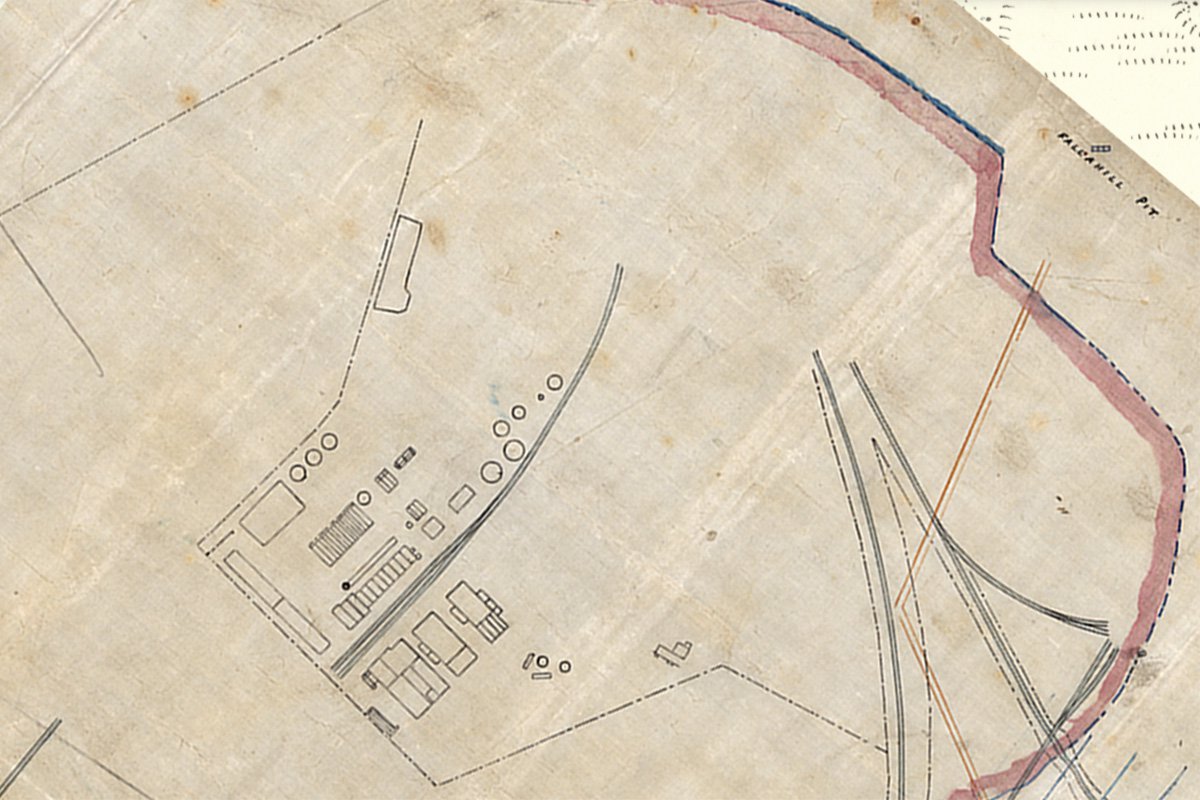
Section of plan of Fauldhouse No.13 pit, courtesy British Geological Survey 016714
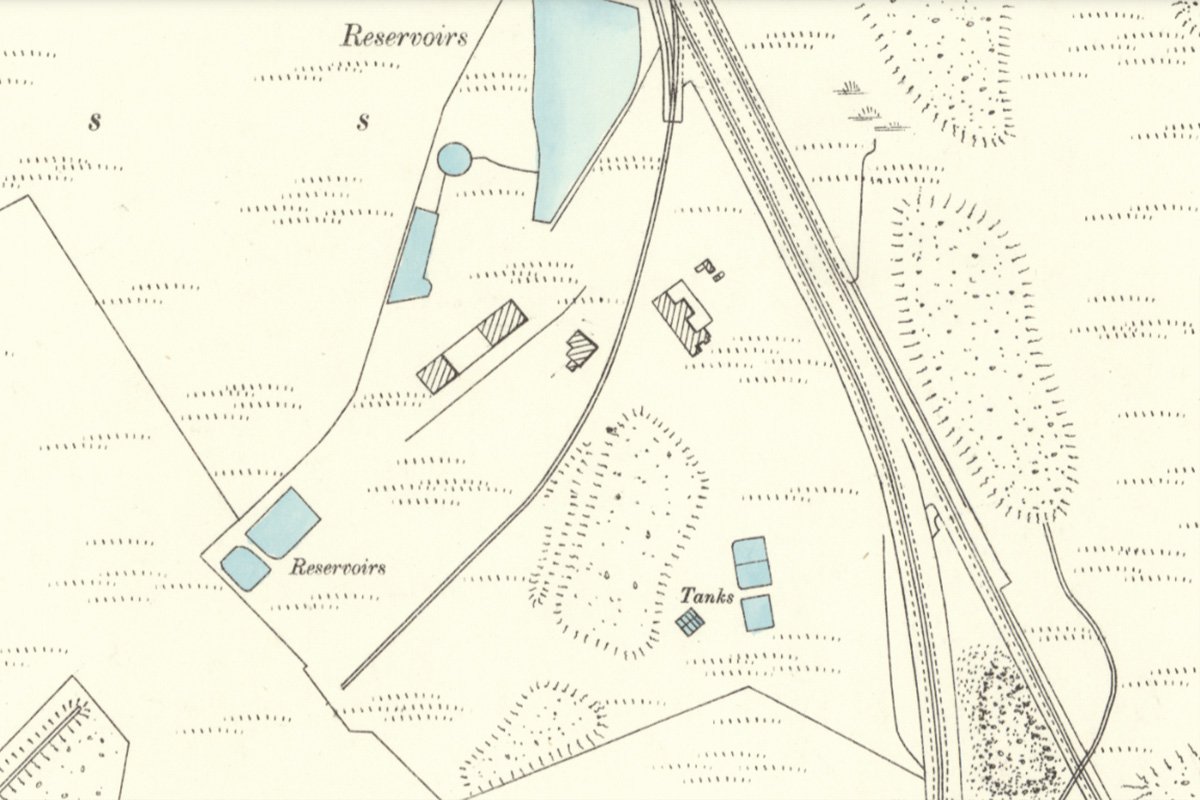
25" OS map, c.1895. courtesy National Library of Scotland
| Date | Rateable Value | Owner | Occupier | Notes |
| 1869-70 | £131.50 | George Simpson | George Simpson | |
| 1871-72 | £500 | Uphall Mineral Oil Company Ltd | Uphall Mineral Oil Company Ltd | |
| 1873-75 | £390 | Uphall Mineral Oil Company Ltd | Uphall Mineral Oil Company Ltd | |
| 1876 | £250 | Uphall Mineral Oil Company Ltd | Uphall Mineral Oil Company Ltd | Works standing |
| 1877 | £140 | Uphall Mineral Oil Company Ltd | Uphall Mineral Oil Company Ltd | Works standing |
| 1878 | £140 | Benhar Coal Company Ltd | Benhar Coal Company Ltd | Ground at oil works |
| 1879 | £140 | Benhar Coal Company Ltd | Benhar Coal Company Ltd | Ground at oil works |
| 1880 | £740 | Broxburn Oil Company Ltd | Broxburn Oil Company Ltd | Oil Refinery |
| 1881 | £740 | Broxburn Oil Company Ltd | Broxburn Oil Company Ltd | Oil Refinery |
| 1882 | £375 | Broxburn Oil Company Ltd | Broxburn Oil Company Ltd | Oil Refinery |
| 1883 | £375 | Broxburn Oil Company Ltd | Broxburn Oil Company Ltd | Oil Refinery |
| 1884 | £802 | West Lothian Oil Company Ltd | West Lothian Oil Company Ltd | Oil Refinery |
| 1885 | £777 | West Lothian Oil Company Ltd | West Lothian Oil Company Ltd | |
| 1886-88 | £1455 | West Lothian Oil Company Ltd | West Lothian Oil Company Ltd | |
| 1889-92 | £1200 | West Lothian Oil Company Ltd | West Lothian Oil Company Ltd | |
| 1893 | £1080 | West Lothian Oil Company Ltd | West Lothian Oil Company Ltd |
Company in liquidation Not working |
| 1894 | £20 | Works Empty |
| Date | Rateable Value | Owner | Occupier | Notes |
| 1869 | £40 | George Simpson | George Simpson | |
| 1870 | £131.50 | William Dixon | George Simpson | |
| 1871-72 | £140 | William Dixon | George Simpson | |
| 1873-74 | £140 | William Dixon | Uphall Mineral Oil Company Ltd |
Recent images
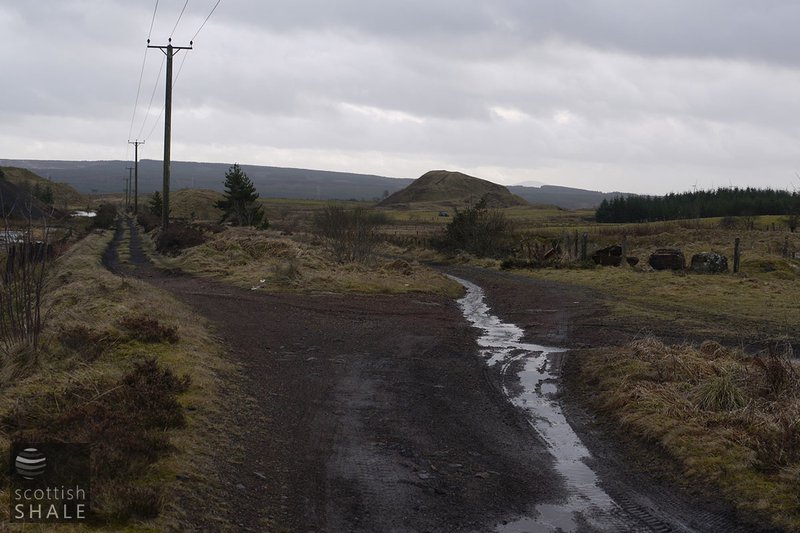
Track following the route of the NBR Benhar branch (left) marked by the line of telegraph poles, track following the parallel CR branch, with gateposts and stones marking the siding entering the oil works site. Looking south. January 2011.
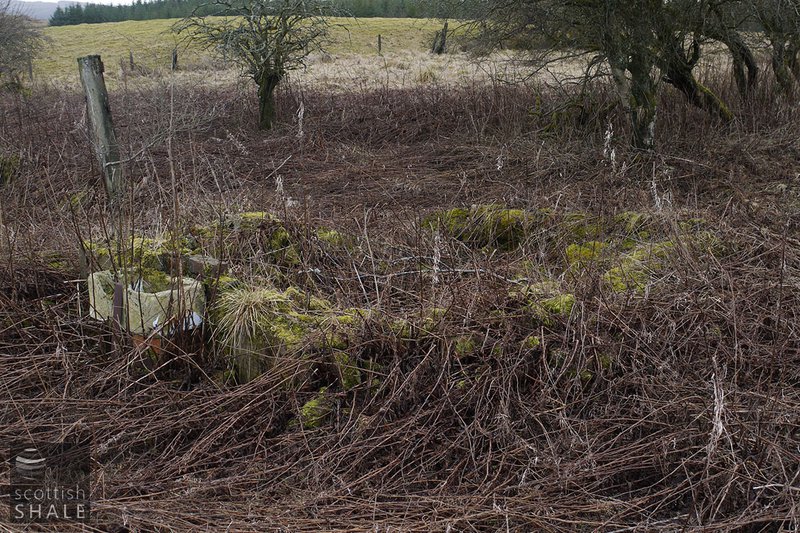
Overgrown foundations of "Brickworks Cottage". Looking south. January 2011.
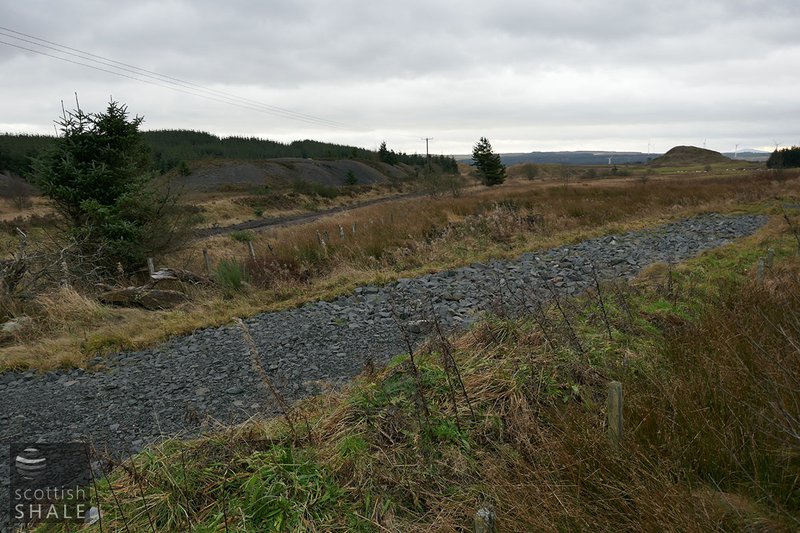
Hardstanding marking the route of the siding into the oil works site. Looking south. December 2016.
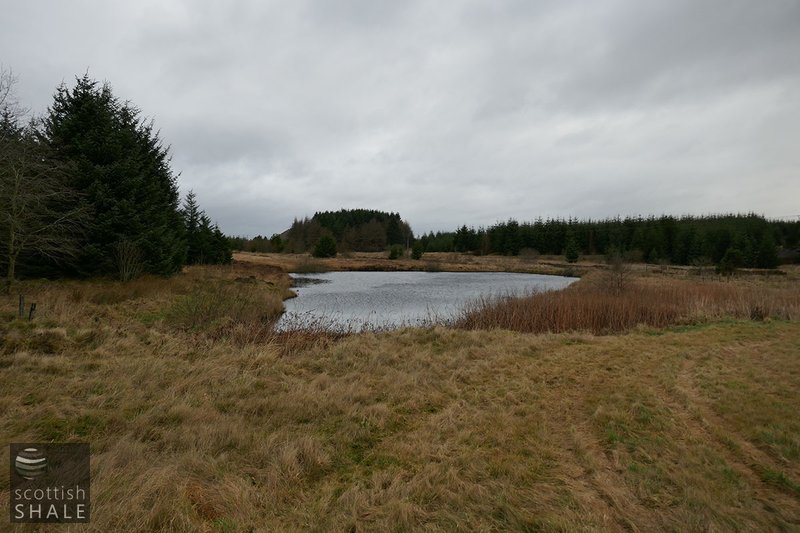
Reservoir on the oil works site. Looking north. December 2016.
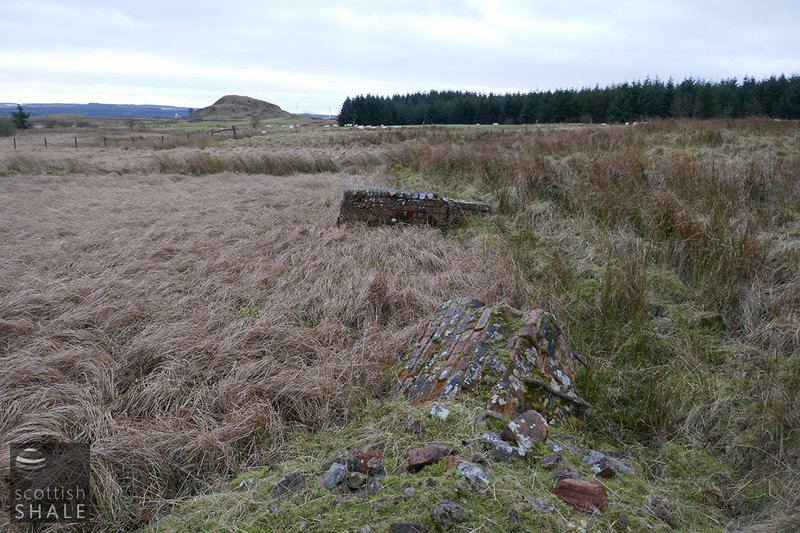
Close-up of brick lined tank and remains of intermediate baffle. Looking south. December 2016.
- 10-Ton Siddeley Ice Machine, 6-Ton Pontifex & Wood Ice Machine,
- 2 Henderson's Patent Coolers,
- 14 Crude Stills with Condensers,
- 9 Fine Oil Stills with Condensers,
- 6 Steam Boilers with Mountings,
- 32 Receiving Boilers, average about 30 ft by 5 ft. 2 60,000 Gallon Tanks,
- 4 50,000 Gallon Tanks, 2 20,000 Gallon Tanks, 5 10,000 Gallon Tanks,
- 5 Donkey Pumps, 7 M.I. Washers, 5 Lead-lined Acid Washers, 8M. I. Soda Washers,
- 6 Hydraulic Presses, 12 German Presses,
- 2 Cooling Drums (Young & Neilson's), 8 Plunger Pumps, M.I. Cooling Pans, various sizes:
- Hydraulic Pumps, 7 M.I. Bleachers, Air Compressing Engine,
- Portable Steam Engine, 625 Yards, double permanent rails,
- Lead-Lined Tar and Acid Blowers and Boxes, 2 Superheaters,
- Engineer's Lathe, Large Quantity M.I. Tubing: Steam, Water, and Oil Pipes: Platform Weighing Machine,
- Large Quantity brass and Flanged Cocks, C.I. Cocks, Brass Wheel Valves, Coopers and Blacksmith's Tools, &c.
Mr George Simpson stated that he was the lessee of the Benhar Colliery, in the parish of Whitburn, from which he raised 70,000 tons annually. was sent by private railroad to the public railway, and did not pass along the road. He believed that if he were assessed upon the number of horses employed, he would contribute a sum fully adequate to the use he made of the road. Cross-examined — He kept two horses present. It was usual for mineral owners to hire horses.
Falkirk Herald, 8th June 1865
.......
Royal Infirmary – The following sums have been received by the treasurer of the Royal Infirmary: Persons in the employment of the Mr. Simpson, Benhar Colliery and Caledonian Oil Works, - £15.
Edinburgh Evening Courant , 9th August 1866
.......
At Benhar, on the 21st inst., the wife of Wm. Newlands, Cooper, Caledonian Oil Works, a son.
Scotsman, 25th October 1867
.......
Railway Accident
On Saturday, an accident occurred the Benhar Colliery branch of the North British Railway, whereby 15 coal waggons, partly the property the coalmasters and the railway company, were almost totally destroyed. The Benhar Colliery branch was constructed some years ago by Mr Simpson of Benhar. but has since been purchased the North British Railway Company, and to save expenditure, no doubt, was made as short as possible. The ground upon which it is formed, forms the ridge of hilly ground, and at one part of the line the gradient is about I in I5. The traffic is worked by tank locomotives, and the load is regulated to the peculiar nature of the gradients, the engines not being allowed take more than 8 full waggons down at a time with iron snibbles put into the wheels of several of them, to assist in retarding their motion.
On Saturday, it appears, 15 large waggons, containing coal, were brought to the top the incline, and the guard having put in one of the snibbles, and supposing the wagons would not run further, went with the engine which takes in water at a pit on the side the branch. Gradually, however. the weight of the train overcame the resistance presented by the snibbled waggon, and gaining momentum, dashed headlong at fearful rate to the bottom of the incline. The consequence was that 13 of the waggons were smashed, being literally piled one over the other. On Sunday, a large staff of men with sufficient engine power, was brought from Morningside for the purpose of clearing away the wreck, and we learn that six or seven of the waggons are beyond repair. The damage will exceed £400.
Hamilton Advertiser, 11th April 1868
.......
The refinery at Uphall is being enlarged and improved by the removal of the plant at Benhar, which has not been in operation for some years.
AGM of the Uphall Oil Company Ltd, reported in the Scotsman, 24th May 1877
.......
In all, the capital expenditure reached the sum of £57,466, but that included £40,483 paid for the Benhar works... Perhaps they would remember that last year they were in litigation in reference to the Benhar works, but they had purchased these at a price which turned out to be a very good investment. The purchase of these would set the Company free from an obligation they were under to the Benhar Company to deliver a large quantity of shale, and that was a satisfactory feature of the bargain.... The quantity of crude oil produced at Benhar (was) one and three-quarter million gallons.
AGM of the Broxburn Oil Company Ltd reported in The Scotsman, 19th May 1881
.......
WEST LOTHIAN OIL COMPANY (LIMITED)
The COMPANY is formed for the purposes of purchasing Oil Refining Works near FAULDHOUSE, with lease of lands connected therewith; also, the LEASE of SHALEFIELD, & c., in the Lands of Deans, Boghall, Caputhall, and Drumcrosshall, near Bathgate, and to carry out the Business of Manufacturers of Mineral Oils and the Products thereof.
Prospectus in The Scotsman, 3rd October 1883
.......
In considering whether we should utilise the refinery at Benhar we found that in order to make these works anything like perfect, a considerable expenditure would have to be incurred. The plant on the ground was of a most inferior description. There was no shale in the immediate neighbourhood, and further, there was no supply of good water, which is essential for profitable manufacture.
AGM of the Broxburn Oil Company, reported in Glasgow Herald, 22nd May 1884
.......
Serious Accident— On Monday while the fitters employed at the West Lothian Oil Company’s Refinery at East Benhar were engaged trying new cover on tar blower for the first time it burst and the explosion threw those engaged the ground One of the fitters named George Weir got his thigh bone and some of his ribs broken and another named Michael Calder got his eyes burned with the hot tar The cover was of cast-iron and over two inches thick.
West Lothian Courier, 7th November 1885
.......
The refining works at Fauldhouse consist of Stills, Washers, Refrigeration, Buildings and the plant and apparatus necessary for refining Crude Paraffin Oil into its various products. These works are of thoroughly modern design, and were erected some four years ago under the personal direction of Mr. James Spencer, the present Manager of the works of the Burntisland Oil Company Ltd. They are connected with both the Caledonian and North British Railways, and have thus the benefit of competing routes for the manufactured products to the principal markets, while the railway carriage for the oil between the crude works and refinery is trifling.
Prospectus of the West Lothian Oil Company 1888. BP archive 143047
.......
FOR SALE, Large Quantity of OIL BARRELS lying at the Works of the West Lothian Oil Co., Fauldhouse. The SUBSCRIBERS will receive Offers up till Noon of Tuesday 3rd May, for the whole or any portion of the undernoted quantities of Oil Barrels lying as above. Viz.- 6500 more or less PETROLEUM OIL BARRELS, 4500 more of less PARAFFIN OIL BARRELS, 3500 more or less LUBRICATING OIL BARRELS. The highest or any offer may not be accepted. THOMSON, JACKSON, GOURLAY & TAYLOR, 24 George Square Glasgow or LINDSAY, MELDRUM, & OATTS, 87 West Regent Street, Glasgow.
Scotsman, 27th April 1892
.......
WEST LOTHIAN OIL COMPANY LIMITED, IN LIQUIDATION
For SALE by Public Roup, in the Facility Hall, Glasgow, Wednesday the 1st June 1892, at Three o'clock Afternoon (unless previously sold privately), ALL and WHOLE the REFINERY PLANT and other (excepting Stock-in-Trade and Stores, which can be had at a Valuation,) erected on the Leasehold Subjects of 11 acres or thereby, at BRAEHEAD, in the Parish of WHITBURN and the County of LINLITHGOW. The Refinery, which is at Fauldhouse, is favorably situated for Railway access, as both Caledonian and North British Railway have sidings into the Works. The Plant has been valued for a break-up at £1700. The duration of the lease is 31 years from Martinmas 1883, UPSET PRICE £5000. Further particulars may be had, and inventories seen, on application to MONCRIEFF, BARR, PATERSON & Co. Writers, Glasgow, who will exhibit the Articles of Roup and Lease.
Scotsman, 23rd May 1892
.......
Alleged Theft an Oilworker.—At Linlithgow Sheriff Court on Wednesday, David Robertson, joiner, Fallahill, Fauldhouse, was charged with having, on one or more of the days between 7th Nov., 1891, and 15th Feb., 1892, at Benhar Oil Refinery, Whitburn, belonging to the West Lothian Oil Company, stolen 12 yards matting, 3 locks, a pair of compasses, chisel, cooper's scollop, a half yard of straining cloth, half-yard of bung cloth, an iron pan, 2lbs. nails, 1 lb. leather, quarter lb. glue, 3 planks wood, and 4 fence posts. Accused pleaded not guilty, and was defended by Mr James Macdonald, solicitor, Linlithgow. The first witness called was Peter Thornton, manager of the West Lothian Oil Company's Refinery Works at Benhar. Prisoner, he said, had been employed by the company for some time. 7th Nov. last the works were closed, and Robertson, with others, was therefore dismissed from the employment. A constable had called on witness and requested to be accompanied to prisoner's house. Shown the articles alleged to be stolen, witness identified all as belonging to the company. Prisoner was foreman of the joiner's shop. Thornton had been manager for the company since July last. He had been in their employment since the formation of the company. Robertson was the only joiner connected with the work.
Linlithgowshire Gazette, 27th February 1892
.......
WEST LOTHIAN OIL COMPANY (LIMITED), IN LIQUIDATION
At FAULDHOUSE OIL REFINERY FAULDHOUSE. On THURSDAY, FRIDAY, AND SATURDAY, 16th, 17th, and 18th NOVEMBER, commencing Each Day at 12 o'clock. IMPORTANT PUBLIC SALE OF MACHINERY AND PLAN, Including
The STORES include- Straining Cloth, Filter Paper, Rivets, Bolts and Nuts, Wrought and Wire Nails, Taps and Dies, Files, Shovels, Finches, Band and Cressing Leather, about 157 Gross Oak Bungs (assorted), Boiled Linseed, Cottonseed, and Rosin Oil, Lardine, Horse Fat, Red and White Lead, Spanish Brown, Patent Dryer, Paint, Glue and a Large Variety of Stores. (Belonging to the WEST LOTHIAN OIL COMPANY, LIMITED, in Liquidation.) WALTER J. BUCHANAN has been favoured with instructions to SELL by PUBLIC AUCTION as above.
On View Tuesday and Wednesday 14th and 15th inst. From 10 till 4 o'clock. Full Particulars in Catalogues, to be had on application at the Auctioneer. For the convenience of Parties returning from the Sale, Express Trains, leaving Glasgow (Central Station) for Edinburgh at 4.50 P.M., and Edinburgh for Glasgow at 4 P.M. will stop at Fauldhouse.
Scotsman, 11th November 1893
.......
The first inquiry under the recently enacted Fatal Accidents Act was held at Linlithgow on Saturday before Sheriff Substitute Melville and a jury. The inquiry was into the circumstances attending the death of Robert Galloway, labourer, Mid Seat Cottage, East Benhar, on 20th July last, who was killed by the falling of a brick wall on the top of him at East Benhar. After several witnesses had been examined, the jury returned a verdict unanimously finding that Galloway met his death by accident, and that the accident which occasioned his death took place on the date mentioned at a brick wall belonging to his father, John Galloway, dealer, Mid Seat Cottage, East Benhar, situated at the old oil refinery at East Benhar, and that the death was caused by the wall having fallen upon him whilst he had undermined it to a dangerous extent with a view to the removal of the bricks composing it, and without having protected himself by propping the wall during the operation.
Falkirk Herald, 17th August 1895


